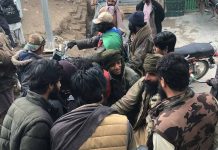The Pakistani government has granted expanded powers to security forces in Balochistan, including the establishment of new “internment centers,” allowing authorities to detain individuals on suspicion for up to three months without formal charges.
The decision comes in the wake of a series of attacks in August, claimed by the Baloch Liberation Army (BLA), targeting military installations across 10 districts in Balochistan. Government and security officials have defended the measures as essential to counter what they describe as a growing insurgency in the region.
Under these expanded powers, military and intelligence agencies can detain individuals without the need for a First Information Report (FIR) or court orders. Officials assert that these steps aim to prevent further attacks and restore order.
The new internment centers are modeled after similar facilities in K-P. In addition to housing detainees, these centers are expected to serve as bases for local militias, formed from residents, including those who have surrendered their weapons. These militias, according to government sources, will assist security forces, similar to the “peace forces” established in Pashtun areas to combat Taliban influence.
It is worth noting that The Balochistan Post first reported plans for these internment centers in July 2024, weeks before the BLA attacks on August 25-26. Reports at the time indicated that the Pakistani military was preparing to establish facilities akin to those seen in K-P, drawing comparisons to Guantanamo Bay-style detention centers.
Human rights organizations have expressed alarm over the expanded military powers and the creation of internment centers, warning of potential human rights abuses. Critics argue that these measures could be used to target civilians and political activists under the pretext of national security, bypassing due process.
Meanwhile, residents in Balochistan have raised concerns about increased military surveillance in their areas. In Nasirabad, Kech district, locals have reported the use of surveillance drones over homes at night, causing significant distress. With irregular electricity forcing many residents to sleep outdoors, the presence of drones has heightened their concerns.
Similar complaints regarding military checkpoints and surveillance in residential areas have been echoed across Balochistan, sparking protests calling for the removal of military camps near civilian homes and schools.





























